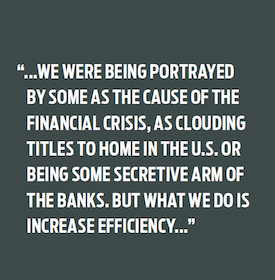It’s early Monday morning and Bill Beckmann, the CEO of MERSCORP — Mortgage Electronic Registration Systems — is boarding a plane. For him, it’s an important ritual. Beckmann lives in St. Louis. MERS is located near Washington, D.C.
He’ll fly home again on Friday. There, he’ll face off against his daughter on the tennis court. Being a serious athlete, she’ll easily mop the floor with Beckmann. She’s fit in another week of practice while he was away, after all.
In the end, Beckmann will be exhausted, boarding the plane again on Monday focused on the week ahead and maybe a little sore. He settles into his seat and gets ready for the journey. During that time he will read; sometimes reports, sometimes industry analytics and sometimes even this magazine.
That flight symbolizes a dramatic shift in Beckmann.
During the time in the air, he gets transformed. He may leave St. Louis a loser on the courts, but, at work in Washington, he is a winner in the courts. That is, the courts of law, where the MERS business model is frequently challenged, and frequently upheld.
“I can count on one hand all of the setbacks we’ve had, but even the cases that haven’t gone our way haven’t stopped us from doing our business. There are still a few important cases we need to defend. There’s a state Attorney General lawsuit in Kentucky that needs to be resolved. There are remaining issues in a fee suit in Pennsylvania and we had a setback in Maine last July, in a case challenging MERS’ right to assign a mortgage (interestingly MERS was not a party to the case), that had adverse consequences for our customers that we are attempting to mitigate.
 "So I don’t want to paint the picture we’re 100% out of the woods, but we have a strong track record legally so there’s no reason to believe it won’t continue. I feel the same about regulatory oversight. We are three years into the consent order and we’ve substantially completed those requirements. In less than three to five years, I anticipate everything will be resolved and we’ll keep moving forward.
"So I don’t want to paint the picture we’re 100% out of the woods, but we have a strong track record legally so there’s no reason to believe it won’t continue. I feel the same about regulatory oversight. We are three years into the consent order and we’ve substantially completed those requirements. In less than three to five years, I anticipate everything will be resolved and we’ll keep moving forward.
“Simply put, the law is on our side.
“If you look at what we do, fundamentally, MERS is the mortgagee on behalf of the investor and its assigns, it’s not a whole lot more complicated than that. And that role as an agent is well rooted in the laws of this country. So when you get down to it, and when we get challenged, we typically prevail. We simply take away all the clutter and present what we do, and what the laws actually say, and we get there.
“When a decision to foreclose needs to be made, it involves whether the repayment of a loan has been made, which relates to transactions that take place between the homeowner, the servicer and investor. Those are the parties who decide on what should happen; MERS takes its direction from the servicer and/or investor. We never earned money in the foreclosure process.”
MERS is a small organization with a big market presence. Beckmann’s MERS is still employing under 100 people. That’s a real benefit, because the company can be nimble and react quickly to the onslaught of negative headlines or other challenges.
But, Beckmann said sometimes it can create a feeling of smallness. There’s this tiny operation out in Virginia that needs to be constantly vigilant of regulatory focus and media attention. It all came as a shock the first day Beckmann started. The “Plan B” or the “safety net” — or whatever it’s called that CEOs have as a backup — simply doesn’t exist at MERS.
“So, you really need to roll up your sleeves and dig into the details, and there are not a lot of folks to delegate to. That was a big change,” he said.
“The big surprise when I got on board was just how misunderstood our role is. MERS is a small, but important, part of the mortgage infrastructure and we were being portrayed by some as the cause of the financial crisis, as clouding titles to homes in the U.S., or being some secretive arm of the banks — in some cases the media and blogs fueled this perception. But what we do is increase efficiency, reduce paperwork and reduce the cost of originating mortgages. So for such a small company to garner a large amount of attention, that was not something I was expecting.”
STICKS AND STONES
Beckmann is correct to refer to media blogs as a large source of information that's not credible on the mortgage financing space. Countless hours by countless authors are spent bashing the way in which mortgages are originated, serviced, tracked and sold.
In May 2013, MERS hit the big time of bashing — The Daily Show with Jon Stewart. On the program one night, The Daily Show applied its unique brand of comical genius to a public/private sector takedown of certain elements of the national foreclosure settlement.
In true fashion, Stewart and his team didn’t pull any punches. The Mortgage Electronic Registration Systems “is like a key party, but instead of f**king your wife, they lose track of the deed to your house,” Stewart said.
The charge may be crass, but it is also the result of years of MERS bashing at the hands of the media.
Foreclosure laws are written state by state, and some are 150 years old and couldn’t envision a model like MERS. And in some cases, judges, who are elected officials, may have their own view about how things should work.
On Oct. 27, 2010, reporter Juan Gonzalez of NY Daily News described Brooklyn judge Arthur Schack as a “local hero,” in coverage of his decision that “casts light on fraudulent mortgage paperwork.”
“The self-described ‘little judge from Brooklyn has dismissed another foreclosure case, this time in favor of an East New York homeowner who did not even have a lawyer,” Gonzalez wrote. “Schack ruled Thursday that California’s OneWest, the last of several banks that relied on an admitted ‘robo-signer’ to transfer the $492,000 mortgage on Covan Drayton’s Hemlock St. home among them, failed to prove it even owns the property in question.”
And how did they fail to prove it owned the property? Well, proof provided by MERS was thrown out after the publicly elected Schack took to Google instead of applying the law when making a decision. Despite this, some of the top journalists covering the space didn’t seem to notice — or if they did, they didn’t care.
 Five months later, The New York Times’ Michael Powell and Gretchen Morgenson followed suit, in an article titled “MERS? It May Have Swallowed Your Loan.”
Five months later, The New York Times’ Michael Powell and Gretchen Morgenson followed suit, in an article titled “MERS? It May Have Swallowed Your Loan.”
The following passage is a lightly edited cut-and-paste from that article that succinctly sums up the type of journalism that passed muster when covering MERS.
“Never heard of MERS? That’s fine with the mortgage banking industry—as MERS is starting to overheat and sputter,” they wrote. “If its many detractors are correct, this private corporation, with a full-time staff of fewer than 50 employees, could turn out to be a very public problem for the mortgage industry.”
“At heart, Judge Schack is scratching at the notion that MERS is a legal fiction. If MERS owned nothing, how could it bounce mortgages around for more than a decade? And how could it file millions of foreclosure motions? “These cases, Judge Schack wrote in February 2009, “force the court to determine if MERS, as nominee, acted with the utmost good faith and loyalty in the performance of its duties.”
“The answer, he strongly suggested, was no.”
The article helped catapult Schack onto the national stage. Here was this judge, rendering these foreclosures invalid and journalists clearly supporting his actions, instead of questioning them.
But that wasn’t the end. Schack’s big moment, what would be the arc in his career trajectory, came in testimony in front of the committee on oversight and government reform March 19, 2012.
“The MERS system lends itself to cases of fraud with respect to home ownership because in New York State for mortgages and assignments to be enforceable they do not have to be recorded,” Schack said.
But then, that all changed.
An article in Forbesin March 2013 covered one of Schack’s orders on appeal, this time from Ocwen. Schack had invalidated a foreclosure from HSBC, and criticized both firms for their handling of the foreclosure process.
Schack also went so far as to order sanctions against Ocwen to the tune of $15,000.
On appeal, however, Schack would, as it were, have his day in court. It wasn’t good.
According to Daniel Fisher, who covered the appeal’s decision for Forbes, “the appeals court threw out the sanctions and ordered the foreclosure proceedings reinstated, strongly criticizing Schack in the process.”
“First, the appeals court noted, Schack had no power to use lack of standing as a reason for dismissing the foreclosure since the borrower had waived that argument by failing to show up in court,” Fisher wrote. “The judge also abused his discretion by holding a hearing on sanctions.”
In 2014, legal victories began to pour in for MERS. Their rights were upheld in Illinois, Minnesota, Rhode Island — the list goes on and on. And so does the negative writing, though that’s becoming more limited to bloggers whose credibility shrinks with each passing day.
On July 8, 2014, author Yves Smith from Naked Capitalism wrote, “let’s hope that these ruling against MERS force fundamental changes to a heretofore unaccountable and recklessly run operation.”
If Smith is referring to all of the victories MERS is experiencing, wouldn’t that prove that, at least, MERS is not a recklessly run operation? Nonetheless, there are some who will believe what they wish to believe, and disregard the wisdom of the courts.
LIVE TO FIGHT ANOTHER DAY
MERS is on the cusp of something big. The Consumer Financial Protection Bureau is moving forward with plans to adopt a universal loan indentifier for every single mortgage originated in the United States. While there are some privacy concerns about this database, there seems no stopping it now.
Beckmann is convinced MERS can help, and he’s not alone.
In a letter to the CFPB, authors include representatives from the Consumer Bankers Association, the American Bankers Association, the Financial Services Roundtable, the Housing Policy Council, the Consumer Mortgage Coalition and the Mortgage Bankers Association. In that letter, these industry groups urge the CFPB to adopt the MERS mortgage identification number for tracking purposes.
In the standards/MISMO section the letter stated, “We also ask the Bureau to consider using, or at least explicitly state that lenders may use, the MERS Mortgage Identification Number (MIN) as the core of a universal loan identifier (ULI) for the HMDA program and other areas where a ULI is required.”
The MIN is the 18-digit number that is permanently assigned to all MERS mortgages. If successful, MERS, a private entity, would enter into a public partnership in tracking the nation’s home loans.
Beckmann is hopeful, but understands the digital space is still slow to adapt to technical progress.
 “One thing hasn’t changed: There’s been a relatively slow adoption of eMortgages and eNotes. Three years ago when I got here, the future was upon us, but the focus on compliance and regulation slowed down the implementation.
“One thing hasn’t changed: There’s been a relatively slow adoption of eMortgages and eNotes. Three years ago when I got here, the future was upon us, but the focus on compliance and regulation slowed down the implementation.
“But, we’re back to ‘getting close’ — we’re going to see it start to happen.
“MERSCORP has a stake in this process. We have processes and mechanisms to help the digital mortgage. Our eRegistry is a proven, secure way to track the note. With it, we can track and ensure that it is the original version of the note. We have 325,000 currently registered, that’s a small fraction, only 1% of transaction volumes. So there’s a lot of opportunity for growth.
“We are integral to the infrastructure of this emerging market, Fannie and Freddie already require the use of the eRegistry with eNotes , but I would also say that it’s not enough, the eNote is the tail end of the process. What we are seeing today is there is a growth in demand for sharing data across counterparties. So what I see in our future is adding a role in the hub of connecting spokes in the data.
“In the next three to five years, this whole space is ready to boom,” he said.
“It’s a process that is not really in the space where we provide services. What does get lost in the conversation, is that on the front end, our value proposition today is the same as it was 15 years ago.
“It’s why 90% of the nation’s top mortgage lenders use us: Consumers would pay more for mortgages without MERS.
“We don’t expect to be a household name with consumers, but we don’t want them to misunderstand our role, either. We still have some work to do there so we can continue to have a prosperous future.”





